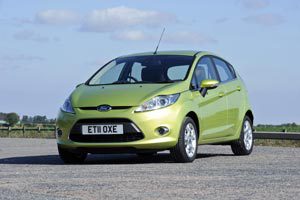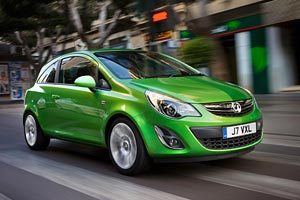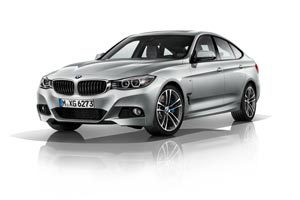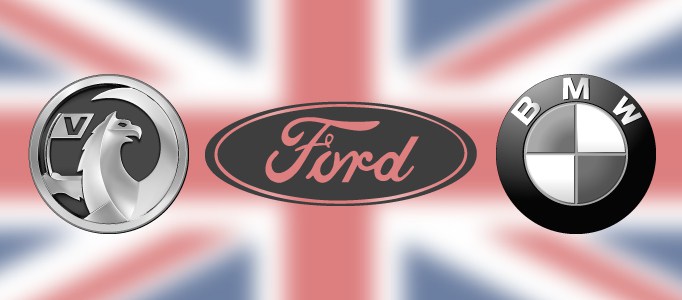The UK car market is worth £10 billion in new and used car sales each year, and accounts for 7.2 per cent of British manufacturing as a whole. (The Telegraph, 2012). This market therefore represents a huge opportunity for car manufacturers, making it an extremely competitive sector. With a large mix of brands manufacturers have stiff competition to capture the attention of consumers and to persuade them to make the all important purchase of their car.
With the automotive industry managing to buck the recent recession, the motoring industry should be congratulated on keeping the market thriving and ensuring consumers continue to spend their disposable income on a new or used vehicle. In the UK BMW, Vauxhall and Ford continue to dominate the UK Car market.
The current market share
Ford and Vauxhall are such prominent brands in terms of ownership that between 2010 and 2011 Ford and Vauxhall accounted for 27% of all licensed cars (Gov UK, 2011) however, in recent years the market has seen increased competition, in particular with German brands performing well.
By comparing industry statistics with our own data at Creditplus we can confirm that for the last 6 years BMW, Ford and Vauxhall have been heavily dominating the car market with the highest amount of inquiries and sales, which year on year have seen continued increases.
From all Creditplus sales in 2012 these three brands were by far the most popular with Vauxhall’s accounting for 13.20%, Fords 12.22% and BMW’s 10.54% of the total number of sales.
A new competitor?
However, at the end of the second quarter in 2013, Volkswagen had taken the lead with 17% of Creditplus sales in comparison to BMW’s 11% and Fords 10.45%/
If that isn’t enough, Volkswagen have pushed up into 3rd position for the total number of cars sold to date in 2013 totaling 101,317 sales, 19,591 being sold In the month of June alone. (bestsellingcarblog, 2013)
So is Volkswagen the company BMW, Vauxhall and Ford have to watch out for? Unsurprisingly, the VW Golf has sold an impressive 5,875 vehicles in June, according to bestsellingcarblog.com. This is most likely to be due to the launch of the MK7 model that was released earlier in the year, with customers deferring their purchase until the new model was launched.
How buying behaviour is changing
Following the recent double dip recession consumers have clearly changed their buying habits and are now polarising away from the standard, medium sized vehicles and opting towards smaller, economical cars, with many owners of older and larger vehicles trading these in, in favour of cheaper, smaller and lower emission vehicles. The small car segment accounted for less than 30% of the UK passenger car market until 1999, but passed the 40% mark ten years later in 2009. A recent report from market research company (Euromonitor, 2013) suggests the small car segment to reach a 45% share of the UK car market by 2020.
The same research has also shown that due to changing lifestyle trends consumers are currently on the look out for something different for their next car and that together price and quality are the two distinct factors influencing their decision making process.
So how have Ford, Vauxhall and BMW managed to dominate the market? It goes without saying the huge success of the Ford Fiesta, the Vauxhall Corsa and the BMW 3 series have helped play an important role in the making of these powerful brands today. So let’s take a look at each manufacturer and key models in more detail.
The Ford Fiesta

© Ford Motor Company.
The Ford Fiesta was first launched in 1976 – over 35 years ago and only a few could have predicted the phenomenal success that it was going to unfold over the coming decades. The Fiesta since has been awarded Britain’s overall best selling car throughout the UK since 2009, with over 16 million models having been sold worldwide.
Ford have managed to maintain their position of market leader by ensuring each model launched is subsequently better than the last. For example the new Ford Fiesta offers an award winning 1.0 Ecoboost petrol engine combines satisfying power with exceptional fuel efficiency of up to 65.7 mpg, perfect for consumers looking to save on money but not performance.
As Roelant de Waard – Vice President of Marketing sales and service for Ford of Europe states “The Fiesta is a special car that has a special place in the hearts of European customers and car lovers around the world, it’s a testament to the original Fiesta from 1976 and remains one of the world’s most popular cars”.

Six generations later
From the low running costs to the attractive styling, practicality and state of the art technology, this car appeals to a wide target audience in difficult times.
From analysing our data here at Creditplus we are able to report that Ford owners are closest to earning the UK’s average wage year on year. Our data shows that on average, 13.67% of a consumers wage goes towards financing their new Ford. This is slightly higher than a Vauxhall which would indicate Ford is slightly more desirable. Customers that came to us in 2012 with a poor credit rating looking for a Ford would have been stretching themselves to afford the repayments with 19% of their wages going on financing the car; this would indicate that they might be buying the car because of its excellent brand reputation, reliability, safety, and practicality aspects, but are willing to financially stretch themselves to achieve this.
If we were to compare this to the data collected for 2006 we would be able to see that people who had a poor credit rating back then would only have to pay approximately 12% on average of their monthly wages to finance their Ford which as a result would mean they have a higher net disposable income.


The Vauxhall Corsa

© GM Company
The Vauxhall Corsa is well known for its impressive running costs, fuel economy, and low c02 emissions. With the on-going concerns with the economy consumers are looking for ways to save money and reduce their impact upon the environment, cars like the Corsa will allow them to achieve this.
Our data shows that Vauxhall owners on the whole earn the lowest salaries when compared with Ford and BMW, although this would suggest they are sensible with their finances and do not live outside their means.
The data would suggest that our customers are choosing to purchase Vauxhall’s due to the price of the vehicle and the value they present with low running costs. This group of consumers are not as influenced by luxury cars which are likely to stretch their finances beyond a comfortable affordability level.


The BMW 3 Series

© BMW Group
BMW possess one of the strongest premium brands in the car industry ranking the 9th most powerful car brand in the world (Forbes,2013).
BMW manages to maintain their positioning through brand awareness and their perception amongst the middle and upper social classes. Although a large proportion of people are opting for cheaper cars, there is still a large market for consumers that want affordable luxury and will be willing to pay a little more to get it.

BMW’s tend to evoke that feeling with their drivers by offering incredible engineering, excellent design innovation and strong customer relationships. BMW are still today the only significant car dealer which use their own parts. Audi and Mercedes, direct competitors of BMW fall into the category of manufacturers that share parts with other brands. Audi share parts with VW and Mercedes use parts from Mitsubishi, Chrysler and Jeep.
BMW also use their strong brand recognition to position the brand as a premium offering. By referring to their own vehicles as the ‘Ultimate driving machine’ they ensure their customers ‘buy in’ to the brands prestige offering. By using an extensive range of product lines all of which are tailored towards different demographics they also strengthen and widen their market opportunities.
Creditplus data shows that BMW owners are the highest earners with an average wage across the seven years (2006-2012) of £24,831.08. BMW drivers on a whole tend to earn 11.2% over the UK average wage.
These types of consumers generally will stretch themselves financially to spend an average of 17.28% of their monthly wages on financing their BMW, and in some cases people will even be seen to stretch to 23%. This data tells us that people looking to finance BMW’s like the ‘finer’ things in life, therefore are prepared to devote large amounts of their monthly salary on luxuries such as BMW cars.


We can also argue that these cars are not being brought because of their price but because of the expensive brand reputation and the terrific driving experience. You could even go as far as consumers are buying their cars as status symbols.
From our data we can also conclude that the BMW 3 series is the most popular enquired about and purchased car on finance within the BMW range. This is hardly surprising when you consider the heritage of the model and the popularity it has shown since it was launched in 1975.
Summary
In summary, as with many other industries, the motor industry in the UK has not escaped the recession unscathed, from our data it is evident to see that the majority of consumers are becoming more environmentally tuned and cautious of their spending hence the shift towards smaller and more eco-friendly vehicles. Vauxhall, Ford and BMW contribute to a high percentage of the current market share with Volkswagen making a strong appearance in 2013 with their new VW Golf.
Have your say






 Facebook
Facebook Twitter
Twitter Instagram
Instagram LinkedIn
LinkedIn Youtube
Youtube